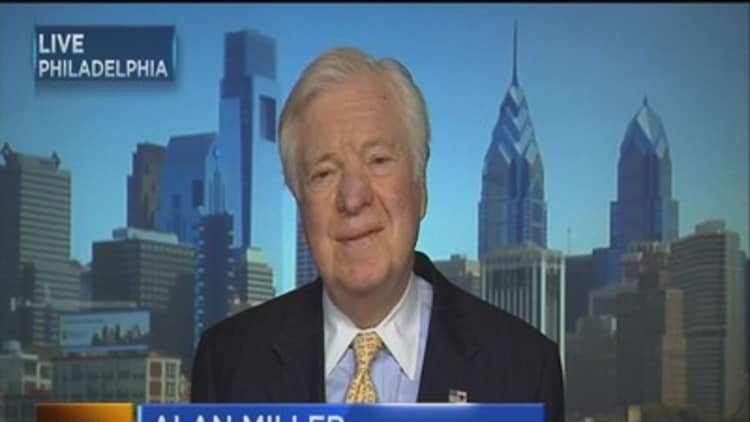As Medicaid and Medicare celebrate their 50th anniversary, the government health-care programs are now one of the biggest drivers of growth for private-sector health-care companies.
Nearly one out of every three Americans is now covered by Medicare or Medicaid, and the private insurers are playing a bigger role in administering those plans.
Insurers this year will see nearly $586 billion from Medicare and $449 billion from Medicaid, versus $400 billion from private insurance, according to estimates from Leerink analyst Ana Gupte.
"People with government health care, that number is growing while the number of people with private insurance with their employer is starting to shrink a little bit," said Ceci Connolly, head of the PwC Health Research Institute. "So, it's a matter of … where the numbers are shifting."
That shift is partly what is driving consolidation within the industry, Gupte said.
"They're trying to capture the growth in Medicare and Medicaid better. And not all of them have equally good exposure to it," Gupte added.
For Anthem, the expansion of the Medicaid program under Obamacare has been a boon for membership growth. The nation's second-largest insurer reported second-quarter profits well above expectations, after adding nearly a million new Medicaid customers in the quarter. Through its proposed merger with Cigna, Anthem is hoping to increase its exposure to the fast-growing Medicare market.
As aging baby boomers have gained coverage, more of them have chosen to buy private Medicare insurance plans over traditional Medicare. In the last decade, the percentage of seniors buying Medicare Advantage plans has more than doubled, from 13 percent to 31 percent, according to data from the Kaiser Family Foundation.

"I think having the private sector more deeply involved in the government programs is likely to make them better," said professor Len Nichols, the director of the Center for Health Policy Research and Ethics at George Mason University. "The public sector has learned from the private sector how to specify the conditions of the contracts with these companies."
But making a profit on the government plans can be a challenge, because the profit margins are slimmer, leaving less room for error.
Humana has been dogged by poor margins on its senior health plans this year because of high medical usage by its members. The nation's largest Medicare plan provider, which has agreed to be acquired by Aetna, expects to get a better handle on costs in the next year.
Read More Obamacare's side effects: Fewer uninsured, better health
As they become more dependent on government health-care plans, insurers also become more exposed to political risk, particularly for Medicaid, which is controlled and partly financed by state governments.
"When the economy gets tight and the politicians are looking to balance a budget, that's a natural pot of money—they're big pots of money—they look to squeeze down," said PwC's Connolly.
On the national level, the rising costs of these entitlements could also be a big issue in the 2016 presidential election.
"To some degree, the next election will have an impact," observed Leerink's Gupte. "I think there will be some differences depending whether there's a Republican or Democrat in the White House, as to what happens to these entitlements."
But on the flip side, Len Nichols says having big insurers now more involved in government health care could benefit Medicare and Medicaid recipients when those programs come under political pressure.
"It gives them now in a way, leverage, and maybe even a voice on behalf of their clients who are the most vulnerable people in our population."
Some in Congress feel particularly protective of those programs. "We must not allow the promise of Medicare and Medicaid to be undermined or be betrayed," said House Minority leader Nancy Pelosi at a Democratic congressional event celebrating the half-century mark for the two programs.



